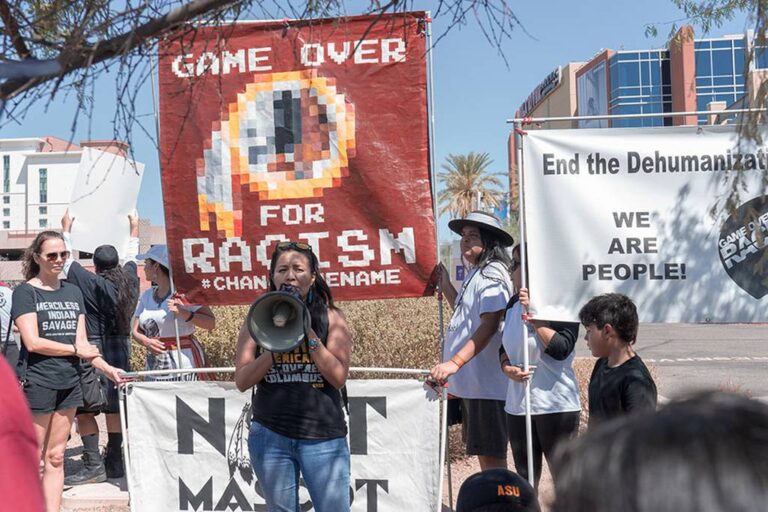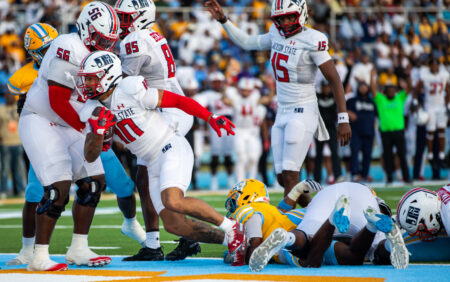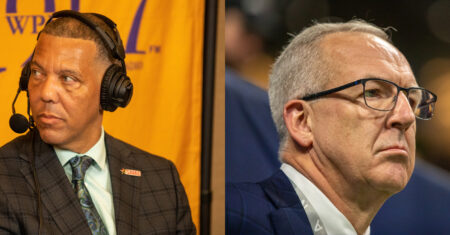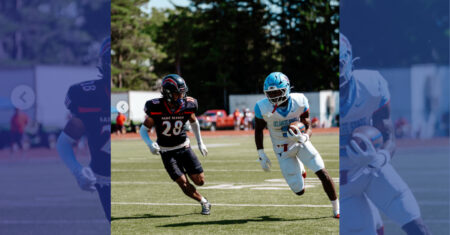Notice: Trying to get property 'post_title' of non-object in /home/ofzfvenynm4q/public_html/wp-content/plugins/wp-rss-feed-to-post/includes/wprss-ftp-display.php on line 109
“We came here and created a blank slate. We birthed a nation from nothing. I mean, there was nothing here. Yes, we have Native Americans, but candidly there isn’t much Native American culture in American culture.”
— Rick Santorum, former U.S. Senator from Pennsylvania, two-time presidential candidate and fired as a CNN commentator in May 2021 based on his remarks about Native Americans.
The noise rumbles down from above like a booming sound wave at an athletic event. Doesn’t matter if it’s from Truist Park in Atlanta, Arrowhead Stadium in Kansas City, or Doak S. Campbell Stadium on the campus of Florida State University.
What do these venues all have in common?
The Tomahawk Chop, that robotic arm movement to “honor” Native Americans all the while moaning some sort of call to battle for the fans.
While it remains at many arenas around the country, its kin folk, the Native American sports mascot, is slowly fading into history.
Many teams have done away with Native American mascots and changed names like the now Cleveland Guardians and Washington Commanders.
A new documentary “Imagining the Indian: The Fight Against Native American Mascoting,” explores the battle to remove the racist mascots haunting American sports teams.
The film opens its national theatrical run in New York at the Quad Cinema on Friday, March 31, coincidentally when Atlanta visits the Washington Nationals.
Atlanta and Chicago of the NHL still tout Native American signatures for their teams while Atlanta continues using the Tomahawk Chop.
Washington removed their racist nickname after two years of being known as the Washington Football Team and changed their name once again to the Commanders in 2022.
But it’s more than just nicknames.
In baseball, Atlanta had a character named Chief Noc-A-Homa (1966-85) coming out of his teepee to “dance” after home runs while Cleveland had Chief Wahoo (1951-2018) as their mascot.
It took a while, but some teams saw the light.
The Edmonton Elks of the Canadian Football League used to be called the Eskimos and the L.A. Clippers of the NBA, formerly based in New York State, were known as the Buffalo Braves.
In New York City, St. John’s changed its name from the Redmen to the Red Storm in 1994.
It’s been a long slog for co-producer Kevin Blackistone of ESPN, Professor of Practice at the Philip Merrill College of Journalism at the University of Maryland, to bring the project to life. The film has a point even if it makes some viewers jittery.
“It does make people uncomfortable,” notes Blackistone. “You can see in the film that people that we interviewed, who you would assume would be very progressive on this issue, are uneasy thinking about how they never were. Me included. That’s part of the reason I did the film.”
Co-producer and co-director Ben West, a Cheyenne, agrees with Blackistone about the awkwardness.
“Sometimes, that’s one of the best tools,” he states. “One of the best ways to move the needle. There is an element of squirminess.”
[ Daily News Editorial (September 2014): SACK THE NAME ]
It took Blackistone, a Washington football fan since he was a child, a while before the problem hit him. Washington was the last team in the NFL to integrate and when he noticed the civil rights movement taking hold, he saw an issue in his own backyard.
“That made me think of the protest of Native Americans against the name and the imagery of the Washington football team,” says Blackistone. “That’s when I made that connection and I started to question my own fanaticism for the team with this name and imagery that people of color found offensive.”
He knew this was an important subject and started the ball rolling by contacting his friend Sam Bardley, writer and producer of the “30 for 30″ ESPN documentary on the late Len Bias.
Besides Blackistone and Bardley there are three other co-producers including West, who co-directed the film along with Aviva Kempner, and Yancey Burns.
Kempner also directed documentaries on New Yorkers in “The Life and Times of Hank Greenberg” and “The Spy Behind Home Plate” about Moe Berg.
“Imagining the Indian” project which commenced in 2014 is a source of pride for West, but he never speaks the team’s racist name and he, like Blackistone, grew up a Washington football fan.
“I became aware at a relatively young age that something was off,” recalls West. “The face on the helmet and the jersey and sweatshirt, which I wore as a kid, wasn’t me.”
“It’s amazing people don’t respect the opinion of those who would be victimized by what they feel to be racist and know to be racist,” points out Blackistone. “That’s the really frustrating part.
“You can still love your team and love the game and just hate the name and be respective of other’s sensibility.”
The film educates the viewer with the history of some of America’s finest athletes. There’s Jim Thorpe (Sac and Fox) who many consider the greatest American athlete. He is a member of both the College and Pro Football Halls of Fame. He also captured two gold medals at the 1912 Stockholm Olympics in the decathlon and pentathlon and played baseball including three stints with the New York Giants.
Marine Lieutenant Billy Mills (Oglala Lakota) captured gold in the 10,000 meters at the 1964 Tokyo Games.
Nevertheless, the film takes a not-so-happy, but necessary, trip down memory lane.
Many of the people interviewed for the film are Native Americans from various tribes like the Pawnee, Oneida, Standing Rock Sioux and Laguna Pueblo represented by current U.S. Secretary of the Interior Deb Haaland.
Suzan Shown Harjo, a long-time Native American activist, who West calls “my Cheyenne Auntie,” is the godmother of the movement to remove racist mascots from American sports teams.
She was a co-producer in the mid-1960s at WBAI Radio in New York for the bi-weekly program “Seeing Red,” the first indigenous news show in the United States.
Harjo was a recipient of the Presidential Medal of Freedom in 2014 from President Obama and calls the work to remove the racist mascots, “a life and death battle for us.”
The campaign continues versus American sports teams and schools.
Cleveland’s baseball and Washington’s football teams have changed names and attitudes, but not everyone.
The NFL’s Kansas City team refuses to remove the Chop but banned headdresses and face paint. MLB’s Atlanta franchise refuses to rename the team and stop the Chop, while Chicago’s NHL team refuses to rename the team but bans headdresses in the arena.
And nearly 2,000 secondary schools across the nation currently use Native American logos or mascots.
The future of removing Native American mascots may need the push from the next generation.
“Young people today have a much better perspective than even I do about what’s right and wrong,” declares West, “and hopefully, as demographics shift in our lawmakers and policymakers, this would be an example that simply would be unavoidable.”
West hopes that the film sticks in the consciousness of America.
“We want people to walk out of the theater and not only be enlightened to why these mascots and other representations are not only offensive and racist but also harmful,” he states.
“[The film] is in no way an attack necessarily on European culture as much as it is the lifting and recognition of Native culture,” reminds Blackistone.
If the movement is looking for a catalyst, Rick Santorum might be your mascot.
In the film’s opening, Santorum, the former two-term U.S. Senator, made his comments before a gathering of the Young American’s Foundation in April 2021. His remarks hit Blackistone hard, but he latched on to it.
“We’ve got to use this,” he recalls thinking when he first heard it. “This is our opening. We should probably cut him a check.”
And maybe Big Chief Santorum is the last victim of the Tomahawk Chop.







